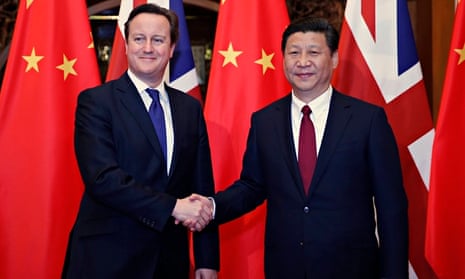Welsh milk may seem an unlikely export to a burgeoning Chinese consumer class better known for its appetite for Burberry macs and Range Rovers. But Laurence Harris has dispatched six shipping containers full of his organic dairy products to China in the past eight weeks.
“It’s quite exciting for a small company in west Wales,” he says. “Milk in general is treated as a health drink in China.” His company, Daioni, has been supplying Pret a Manger outlets in Hong Kong – and has seen little evidence of the slowdown in Chinese growth that has started to show up in official statistics.
“The figures are frightening: the development in China is immense, regardless of what they say. It’s just huge – and very exciting.” He says having a son who lived in Hong Kong has helped him to understand the market better, and that building up strong relationships had been key.
In general, British exporters have been relatively late to the China party. After more than a decade of rampant growth in the vast Asian economy, and with the enthusiastic support of government ministers, who have travelled to China on a seemingly endless round of trade missions, it scored as Britain’s sixth biggest market in November, worth £1.4bn — narrowly edging out Belgium and Luxembourg.
But as the Chinese economy shifts down a gear, in a deliberate attempt by policymakers to achieve a more sustainable growth model, there are fears some firms could get their fingers burnt. There is already evidence of waning demand as well as belt-tightening amid a government crackdown on ostentatious spending.
Last week, London-listed brewer SABMiller was the latest company to bemoan “difficult trading conditions” in China. The company behind Peroni and Grolsch said poor summer weather was to blame, but analysts also pointed to the economic slowdown, as sales volumes in China fell 9% in the latest quarter and by double digits in some parts of the country.
Consumer goods multinational Unilever, which makes Dove soap, Ben & Jerry’s ice-cream and Persil, also recently reported a 20% drop in sales in China in the fourth quarter.
At the other end of the consumer market, exports of British powerboats to China – a symbol of our reputation for producing high quality, luxury products – have been under pressure.
Sales to China from the UK’s marine industry, which includes boatbuilders as well as equipment and parts makers, have halved since 2012. In the year to April 2014, sales were £34m, down sharply from £52m a year earlier and £71m the year before that. That reflects a wider pattern for the UK industry of falling exports but rising domestic demand, which for the last full year left total sales up just 1% at £2.9bn.
Part of the drop in Chinese trade was down to the volatile nature of powerboat sales, a big-ticket item which even the flashiest billionaires only tend to buy once in a while, says Howard Pridding, chief executive of the British Marine Federation. But it also reflects a loss of momentum in the Chinese economy.
“Our leading boatbuilders have established a presence in China now and are building their brands, but the figures may demonstrate the initial market has been absorbed as well as reflecting the slowdown,” he says.
Rowan Crozier runs Birmingham-based Brandauer, which makes small metal parts (such as the electrical contacts in kettles) and sends 3m parts a week to China. He says he has not yet felt evidence of a slowdown but sees uncertainty about the outlook for China.
“We are looking at a very strange economy globally at the moment: I can’t plan my business long term. I just have to be very lean, and flexible.”
He says demand could fluctuate by 20% in either direction from one month to the next – unprecedented in his memory. “It’s the whole world that’s doing that: we have to be more flexible about the way we hold stock, about the way we employ staff.”
He says his approach to entering the Chinese market has been to piggyback on manufacturers who were already purchasers of Brandauer parts and subsequently moved their operations out to China.
West Midlands manufacturer Tony Sartorius says part of the answer to the changeable climate for British firms was to make sure they were not too heavily dependent on demand in any single economy. For now, his aluminium die-casting business has not felt the slowdown.
Like many exporters, Alucast has spread itself across international markets. Overseas sales make up a quarter of annual turnover of £7m and its parts for the automotive business and other industries are being shipped to countries including the US, Hungary and Romania as well as China.
“I only hear that China has slowed down. It’s still a massive market,” says Sartorius, Alucast’s chairman. “China is not a significant feature for us … you don’t ever want to be in just one market.”
Fenella Barber, director of the China-Britain Business Council, says the policy change in Beijing should create opportunities in some sectors. The latest economic plan included a promise to boost the services sector, and creative industries, for example – areas in which Britain is strong.
“China seems very opaque, but it just has different ways of operating,” she says. “It’s all there in the five-year plan. So as a China-watcher, you can see the direction of travel.”





Comments (…)
Sign in or create your Guardian account to join the discussion